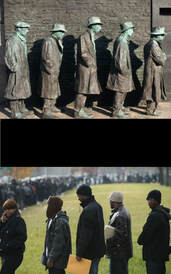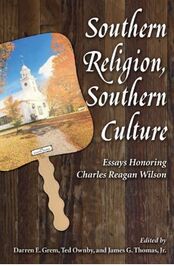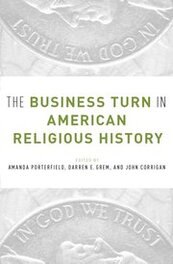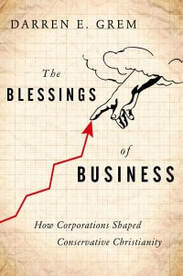Books

Hard Times, U.S.A.: The Great Depression and New Deal in American Memory is a cultural and political history of the greatest crisis in modern capitalism after it ended. Between 1945 and 1980, the Great Depression became less of a direct experience of deprivation and more of a remembered set of public, even polemical, narratives. Memorials to FDR, Hoover, the New Deal, and other figures, sites, and stories deployed religious language and imagery to turn capitalism's collapse into a redemptive, patriotic arc fit for an emerging Cold War world. Through popular culture, numerous artists, musicians, filmmakers, and writers often cast "hard times" as an individualized spiritual crisis instead of a social or political one. Meanwhile, in the political sphere, the 1930s became a means to undergird or undercut the New Deal state. Activists and representatives in the nation's major political parties used the depression's hardest years to advance their respective aims and aspirations, often to the chagrin of their constituents, many still remembering or retelling personal or passed-down "thirties stories," or harboring scars still fresh in mind and body.
Post-Depression wrangling over its remembrance reshaped acceptable narratives about capitalism and the state while justifying new deprivations. Narratives of striving and sacrifice through the challenges imposed by region, religion, race, and gender became the defining mark of "proper" citizenship in a nation where capitalism's hard times never ended: they simply became individualized, regionalized, romanticized, or marginalized. As a result, in a new era of slow-rolling and subtle, instead of dramatic and visible, inequalities, millions of Americans remain waiting in line like their Depression-era forebears. Yet, heading into the 2030s, unlike in the 1930s, the old New Deal's promises of relief, recovery, or reform seem fleeting in a nation where deprivation's scars are now internalized, ignored, or excused rather than told, heard, and redressed.
Though currently at the research and writing stage, excerpts are in the works regarding the forgetting and remembrance of the General Textile Mill Strike of 1934, the memory politics of the recessionary 1970s as presented via The Waltons television series, and the transformation of Herbert Hoover from political pariah to conservative polestar by movement Republicans before and after the former President's death in 1964.
Post-Depression wrangling over its remembrance reshaped acceptable narratives about capitalism and the state while justifying new deprivations. Narratives of striving and sacrifice through the challenges imposed by region, religion, race, and gender became the defining mark of "proper" citizenship in a nation where capitalism's hard times never ended: they simply became individualized, regionalized, romanticized, or marginalized. As a result, in a new era of slow-rolling and subtle, instead of dramatic and visible, inequalities, millions of Americans remain waiting in line like their Depression-era forebears. Yet, heading into the 2030s, unlike in the 1930s, the old New Deal's promises of relief, recovery, or reform seem fleeting in a nation where deprivation's scars are now internalized, ignored, or excused rather than told, heard, and redressed.
Though currently at the research and writing stage, excerpts are in the works regarding the forgetting and remembrance of the General Textile Mill Strike of 1934, the memory politics of the recessionary 1970s as presented via The Waltons television series, and the transformation of Herbert Hoover from political pariah to conservative polestar by movement Republicans before and after the former President's death in 1964.

Southern Religion, Southern Culture, co-edited with Ted Ownby and James G. Thomas, Jr., examines the intersections of region, religion, and culture. Essays focus on African-American religious education, religion in blues culture, borderland Episcopalian missionaries, sports and religion, Pentecostal print culture, southern relic-making, and the religious meanings of Elvis. The volume honors the career and work of Charles Reagan Wilson, Professor Emeritus at the University of Mississippi and a leading scholar of religious studies and southern culture.
Published in 2019 by University Press of Mississippi.
REVIEWS
"Here broad interpretations of religion are not a gimmick; they are instead testaments to the pervasiveness of religious impulses, and to the reciprocal influence between the churches and culture of the American South. Wilson gave scholars permission to grapple with this dynamic church-culture interplay in new and creative ways, and since each essay bears his unmistakable imprint, Southern Religion, Southern Culture is a fitting tribute to one of the most influential scholars of southern religious history."
- Christopher C. Moore, Journal of Southern Religion
"Specialists in the field will find some of the topical essays in this volume useful as they teach and undertake further research. More general readers of American or religious history will benefit from the introductory and concluding essays, which could lead them into Wilson’s own books and articles, a body of scholarship worthy of the celebration this book intends, featuring methods that can tell the story of religion better in almost any region or tradition. "
- Nicholas M. Beasley, Anglican and Episcopal History
"In this Festschrift, Southern Religion, Southern Culture: Essays Honoring Charles Reagan Wilson, editors Darren E. Grem, Ted Ownby, and James G. Thomas Jr. have compiled a collection that is appropriately diverse in its content and consistent in employing the creativity cultivated by the honoree. On topics that range from antebellum Episcopalians in politics to African American education, Holiness media innovation, football goalposts, and macabre southern relics, the essays in this volume successfully reflect the powerful impact that Wilson has had on the field of southern history. "
- Charity W. Rakestraw, The Journal of Southern History
Published in 2019 by University Press of Mississippi.
REVIEWS
"Here broad interpretations of religion are not a gimmick; they are instead testaments to the pervasiveness of religious impulses, and to the reciprocal influence between the churches and culture of the American South. Wilson gave scholars permission to grapple with this dynamic church-culture interplay in new and creative ways, and since each essay bears his unmistakable imprint, Southern Religion, Southern Culture is a fitting tribute to one of the most influential scholars of southern religious history."
- Christopher C. Moore, Journal of Southern Religion
"Specialists in the field will find some of the topical essays in this volume useful as they teach and undertake further research. More general readers of American or religious history will benefit from the introductory and concluding essays, which could lead them into Wilson’s own books and articles, a body of scholarship worthy of the celebration this book intends, featuring methods that can tell the story of religion better in almost any region or tradition. "
- Nicholas M. Beasley, Anglican and Episcopal History
"In this Festschrift, Southern Religion, Southern Culture: Essays Honoring Charles Reagan Wilson, editors Darren E. Grem, Ted Ownby, and James G. Thomas Jr. have compiled a collection that is appropriately diverse in its content and consistent in employing the creativity cultivated by the honoree. On topics that range from antebellum Episcopalians in politics to African American education, Holiness media innovation, football goalposts, and macabre southern relics, the essays in this volume successfully reflect the powerful impact that Wilson has had on the field of southern history. "
- Charity W. Rakestraw, The Journal of Southern History

The Business Turn in American Religious History, co-edited with John Corrigan and Amanda Porterfield, is a collection of essays that reconsiders the role of business in American religious culture and politics. Subjects include Protestant fundamentalists and corporate culture, Jewish women and philanthropy, Mormon struggles with capitalism, the "guru" as business icon, conservative Catholic CEO's, Native American casinos, and evangelical media empires.
Published in 2017 by Oxford University Press.
REVIEWS
"Rich in historical detail and fresh with theoretical insight, The Business Turn in American Religious History challenges and inspires new ways of reading and constructing American religious history." -- Daniel Jones, Religious Studies Review
"Rare is the essay collection that advances a scholarly paradigm shift. The Business Turn in American Religious History is one of those exceptions. Amanda Porterfield, Darren Grem and John Corrigan's volume offers a definitive word on the history of faith and corporate capitalism in America... From beginning to end, then, The Business Turn in American Religious History delivers one rich and surprising insight after another... In sum, this volume is a state of the art/state of the field address, one that scholars will find invaluable for their work in the archives and on the written page, as well as in the classroom." -- Darren Dochuk, Journal of Ecclesiastical History
"Together, the essays collected here offer new ways of conceptualizing the interdependence of religion and business in the United States, establishing multiple paths for further study of their intertwined historical development." --The Southern Register
"As the authors of the essays in this volume show, examining religion and religious institutions through the lens of business provides numerous insights into how religions gain influence, how they spread, both in the United States and throughout the world, and how their members come to terms with serving both God and mammon. The book is highly recommended for scholars of both religious history and business history." -- Matthew C. Godfrey, Reading Religion
Published in 2017 by Oxford University Press.
REVIEWS
"Rich in historical detail and fresh with theoretical insight, The Business Turn in American Religious History challenges and inspires new ways of reading and constructing American religious history." -- Daniel Jones, Religious Studies Review
"Rare is the essay collection that advances a scholarly paradigm shift. The Business Turn in American Religious History is one of those exceptions. Amanda Porterfield, Darren Grem and John Corrigan's volume offers a definitive word on the history of faith and corporate capitalism in America... From beginning to end, then, The Business Turn in American Religious History delivers one rich and surprising insight after another... In sum, this volume is a state of the art/state of the field address, one that scholars will find invaluable for their work in the archives and on the written page, as well as in the classroom." -- Darren Dochuk, Journal of Ecclesiastical History
"Together, the essays collected here offer new ways of conceptualizing the interdependence of religion and business in the United States, establishing multiple paths for further study of their intertwined historical development." --The Southern Register
"As the authors of the essays in this volume show, examining religion and religious institutions through the lens of business provides numerous insights into how religions gain influence, how they spread, both in the United States and throughout the world, and how their members come to terms with serving both God and mammon. The book is highly recommended for scholars of both religious history and business history." -- Matthew C. Godfrey, Reading Religion

The Blessings of Business: How Corporations Shaped Conservative Christianity argues that evangelical fandom for big-name business moguls and strategic culture warriors like Donald Trump is nothing new. Sweeping from the late nineteenth century to the present, the book reveals how corporations and corporate leaders, money, organizations, and power were essential to the creation and proliferation of conservative brands of Christian culture and politics.
Published in 2016 by Oxford University Press.
Named a Choice Outstanding Academic Title
REVIEWS
"Stellar... The Blessings of Business is, in short, a strikingly comprehensive synthesis, brilliant in its combination of sweeping and probing analysis." -- Darren Dochuk, Business History Review
"A worthy contribution[. . . .] Grem is especially adept at teasing out the interconnections among these various individuals and groups, as well as pointing out the racism and homophobia that underlies many of these companies and the labor practices in their supply chains." -- Randall Balmer, American Historical Review
"Packed with fascinating biographical and institutional details. . . . Grem astutely details the increase in social, cultural, and political power resulting from the millions and millions of dollars [businessmen] donated to evangelical organizations. In this invaluable book . . . [are] gems . . . born of assiduous historical research [that] ought to secure for The Blessings of Business a lasting place on reading lists in twentieth-century religion, business, and politics." -- Alexis McCrossan, Journal of American History
"The book's greatest strength is in its careful analysis of the records, and production, of Christian businesses...he successfully addresses southern religion, and the ways that many of the businesses he follows are both southern- and Christian-identified." - Janine Giordano Drake, Journal of Southern Religion
"This is an excellent and ambitious book. Grem has done a tremendous amount of research, his writing is clear, and his examples are consistently engaging. The book is a welcome addition to the exploding historiography on modern American evangelicalism. . This is a wonderful book certain to have a major impact for years to come." -- Matthew Avery Sutton, Journal of Religion
"Darren E. Grem's The Blessings of Business . . . offers a necessary glimpse into the world of conservative evangelical Christianity and the businessmen and corporations that supported its rise to religious and cultural dominance in public life. This is a helpful book for those interested in both history and religion, and is sure to be an enlightening read." --Blake I. Campbell, Journal of Markets & Morality
"The foremost criteria for a historical book is whether it meets its stated objective. Grem succeeds in meeting all three of his explicit objectives: he shows how corporations shaped conservative Protestant Christianity; exposes the business side of American religion, with its cultural and political ramifications; and places the construction of American religion within the history of corporate capitalism. Provocative, informative, and required reading for all who wonder how conservative evangelicalism became linked at the hip with modern free-market capitalism, Grem's book shows how many Christians came to reconcile serving both God and mammon." -- Brandon J. Payne, H-Net
Published in 2016 by Oxford University Press.
Named a Choice Outstanding Academic Title
REVIEWS
"Stellar... The Blessings of Business is, in short, a strikingly comprehensive synthesis, brilliant in its combination of sweeping and probing analysis." -- Darren Dochuk, Business History Review
"A worthy contribution[. . . .] Grem is especially adept at teasing out the interconnections among these various individuals and groups, as well as pointing out the racism and homophobia that underlies many of these companies and the labor practices in their supply chains." -- Randall Balmer, American Historical Review
"Packed with fascinating biographical and institutional details. . . . Grem astutely details the increase in social, cultural, and political power resulting from the millions and millions of dollars [businessmen] donated to evangelical organizations. In this invaluable book . . . [are] gems . . . born of assiduous historical research [that] ought to secure for The Blessings of Business a lasting place on reading lists in twentieth-century religion, business, and politics." -- Alexis McCrossan, Journal of American History
"The book's greatest strength is in its careful analysis of the records, and production, of Christian businesses...he successfully addresses southern religion, and the ways that many of the businesses he follows are both southern- and Christian-identified." - Janine Giordano Drake, Journal of Southern Religion
"This is an excellent and ambitious book. Grem has done a tremendous amount of research, his writing is clear, and his examples are consistently engaging. The book is a welcome addition to the exploding historiography on modern American evangelicalism. . This is a wonderful book certain to have a major impact for years to come." -- Matthew Avery Sutton, Journal of Religion
"Darren E. Grem's The Blessings of Business . . . offers a necessary glimpse into the world of conservative evangelical Christianity and the businessmen and corporations that supported its rise to religious and cultural dominance in public life. This is a helpful book for those interested in both history and religion, and is sure to be an enlightening read." --Blake I. Campbell, Journal of Markets & Morality
"The foremost criteria for a historical book is whether it meets its stated objective. Grem succeeds in meeting all three of his explicit objectives: he shows how corporations shaped conservative Protestant Christianity; exposes the business side of American religion, with its cultural and political ramifications; and places the construction of American religion within the history of corporate capitalism. Provocative, informative, and required reading for all who wonder how conservative evangelicalism became linked at the hip with modern free-market capitalism, Grem's book shows how many Christians came to reconcile serving both God and mammon." -- Brandon J. Payne, H-Net
